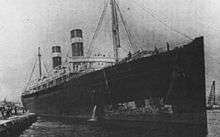SS Saint Paul (1895)
_under_steam.tif.jpg) The elegant ocean liner SS St. Paul under steam | |
| History | |
|---|---|
| Name: | USS Saint Paul |
| Builder: | William Cramp & Sons, Philadelphia, Pennsylvania |
| Launched: | 10 April 1895 |
| Acquired: | by charter, 12 March 1898 |
| Commissioned: | 20 April 1898 |
| Decommissioned: | 2 September 1898 |
| Recommissioned: | 27 October 1917 |
| Decommissioned: | 14 January 1919 |
| Fate: | Returned to owner, 24 March 1919 |
| General characteristics | |
| Type: | Passenger ship/Auxiliary cruiser |
| Displacement: | 14,910 long tons (15,150 t) |
| Length: | 553 ft 2 in (168.61 m) |
| Beam: | 63 ft (19 m) |
| Draft: | 28 ft (8.5 m) |
| Speed: | 22 kn (25 mph; 41 km/h) |
| Complement: | 381 officers and enlisted |
| Armament: |
|
The SS Saint Paul was a trans-Atlantic ocean liner named for the capital of Minnesota.
Saint Paul was launched on 10 April 1895 by William Cramp & Sons, Philadelphia, as a steel passenger liner; chartered for United States Navy service as an auxiliary cruiser from her owner, International Navigation Company, by a board appointed on 12 March 1898; and commissioned on 20 April 1898 for Spanish–American War service, Captain Charles D. Sigsbee in command.
Service history
Spanish–American War

Departing Philadelphia on 5 May 1898, Saint Paul's first assignment was to cruise in search of Admiral Cervera's squadron between Morant Point, Jamaica, and western Haiti. She captured the British collier Restormel—bound for Cuba with a critical cargo of Cardiff coal—on 25 May and sent her into Key West under a prize crew. She cruised off Santiago de Cuba and Guantanamo Bay into mid-June, then sailed to join the force blockading San Juan, Puerto Rico.
Saint Paul arrived off San Juan on the morning of 22 June. Shortly after midday, in the 2nd battle of San Juan, the Spanish cruiser Isabel II, emerged from the harbor and, remaining under protection of shore batteries, opened fire on Saint Paul at long range without success. Isabel II was joined shortly by the destroyer Terror, which attempted to close Saint Paul to launch torpedoes. Saint Paul took Terror under heavy fire, scoring at least one direct hit which heavily damaged the destroyer. Terror gave up the attack and returned to port, followed by Isabel II. Saint Paul was relieved by Yosemite off San Juan on the 26th and made for New York to coal.
Saint Paul spent the remainder of her Spanish–American War service as a transport, operating for 48 days in July–August as a War Department vessel. She landed troops at Siboney, Cuba, and Arroyo, Puerto Rico, subsequently returning soldiers from Guantanamo Bay to New York City through 15 August. Entering the Cramp shipyard on 22 August for reconversion to mercantile service, Saint Paul was decommissioned on 2 September and returned to her owner the same day.
World War I
.jpg)
Saint Paul was again taken over for wartime service on 27 October 1917. Operated by the United States Shipping Board as a transport on the War Department account, she retained her merchant crew and carried a naval armed guard on board. She made twelve voyages between New York and Liverpool, England. She was transferred to the Navy account in April 1918; designated SP-1643; and overhauled at New York. Then, while being towed to her berth from dry dock on 28 April, she capsized in the North River. Righted on 11 September, she was subsequently turned over to the Commandant, 3rd Naval District, on 17 October.
Saint Paul entered the New York Navy Yard the following day, but World War I's end led to cancellation of plans to use the ship for carrying troops.
Post-war
Placed in temporary commission on 14 January 1919 for the purpose of fixing responsibility for her care outside the Navy Yard, Saint Paul soon began reconversion for mercantile service. Returned to her owner on 24 March 1919, Saint Paul was scrapped in Germany in 1923.
References
| Wikimedia Commons has media related to USS Saint Paul (SP-1643). |
- This article incorporates text from the public domain Dictionary of American Naval Fighting Ships. The entry can be found here.
External links
- Photo gallery of USS Saint Paul at NavSource Naval History
- Video dedicated to the ocean liner SS St. Paul